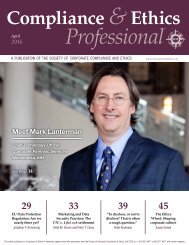Compliance & Ethics-Lanterman interview
Create successful ePaper yourself
Turn your PDF publications into a flip-book with our unique Google optimized e-Paper software.
FEATURE<br />
so that the proper resources can be diverted<br />
to an organization’s “crown jewels.” But this<br />
question is really dependent on the policy<br />
choices an organization and, perhaps in some<br />
cases, what an industry’s standard dictates.<br />
AT: I remember a few years ago there was a<br />
lot of press about companies getting rid of old<br />
photocopiers and not realizing that thousands<br />
of their documents might be stored on them.<br />
I imagine most have gotten better about that,<br />
but should compliance officers be worried<br />
about all the old laptops and smartphones<br />
hanging around? Are<br />
they being disposed<br />
of properly?<br />
ML: As much as<br />
the industry should be<br />
concerned about external<br />
attacks, it is important<br />
to not forget about the<br />
smaller, seemingly<br />
innocuous security<br />
lapses. Data exfiltration<br />
from negligence happens<br />
all the time, which is<br />
a shame, given how easy it is to prevent.<br />
Think about a breach in the form physical<br />
device theft. For instance, as you know in the<br />
healthcare industry, data breaches that affect<br />
500 patients or more must be reported to<br />
the U.S. Department of Health. Hundreds of<br />
reported incidents involve stolen laptops and<br />
phones. With theft, there is clear evidence that<br />
data has been stolen. In the case of disposal,<br />
companies often fail to securely wipe data<br />
before selling or recycling. Failing to recognize<br />
this, these types of breaches would never be<br />
reported, as no one would expect anything to<br />
be wrong.<br />
AT: That leads to one last area to explore:<br />
smartphones. These days most everything<br />
is kept on them. How secure are they? What<br />
There are always<br />
threats that are unique<br />
to mobile computing.<br />
For example, like public<br />
restrooms, public Wi-Fi<br />
should never be trusted<br />
like your own.<br />
should compliance officers be asking their IT<br />
teams to make sure that they truly are secure?<br />
ML: Mobile devices have changed<br />
how work gets done. While they are often<br />
secure, it all depends on how they are used.<br />
There are always threats that are unique to<br />
mobile computing. For example, like public<br />
restrooms, public Wi-Fi should never be<br />
trusted like your own. Public Wi-Fi networks<br />
are very useful, but there is always a risk in<br />
using them, because they can be a portal for<br />
cyber criminals to steal your valuable data,<br />
including usernames and passwords. This<br />
alarming trend is what<br />
is known as a “man-inthe-middle”<br />
attack.<br />
Essentially, this kind of<br />
attack enables a hacker<br />
to eavesdrop on your<br />
Internet connection,<br />
intercept your<br />
communications, and<br />
in some cases, reroute<br />
your connections to<br />
their own malicious<br />
webservers and<br />
material. For many websites you may visit<br />
regularly, a hacker can remove the encryption<br />
from the websites’ secure login pages.<br />
Again, there is always the persistent and<br />
very real increased risk of device theft, not<br />
just of smartphones, but all mobile devices.<br />
Considering all this, I would suggest that<br />
compliance officers ask IT about public Wi-Fi<br />
use prevention and data encryption. With<br />
encryption, data on mobile devices is rendered<br />
inaccessible to a thief.<br />
AT: So, once the company-issued<br />
devices are covered, that’s only halfway<br />
there. There are still the personal devices<br />
that employees are using. What protocols<br />
should be in place if a company has a<br />
“bring-your-own-device” policy?<br />
<strong>Compliance</strong> & <strong>Ethics</strong> Professional ® April 2016<br />
+1 952 933 4977 or 888 277 4977 www.corporatecompliance.org 17







